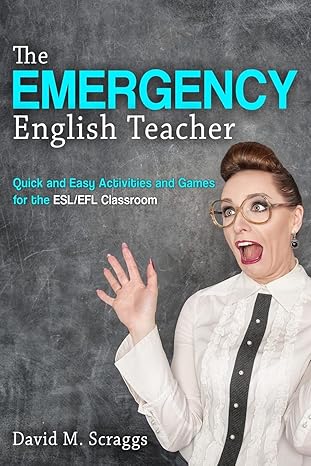Task: Describing a room
Student Level: Beginner, Lower intermediate
Target Language Skills: Practice long-term speaking, using prepositions of place, articles (a, an, the), and adjectives.
Lesson Time: 50 minutes
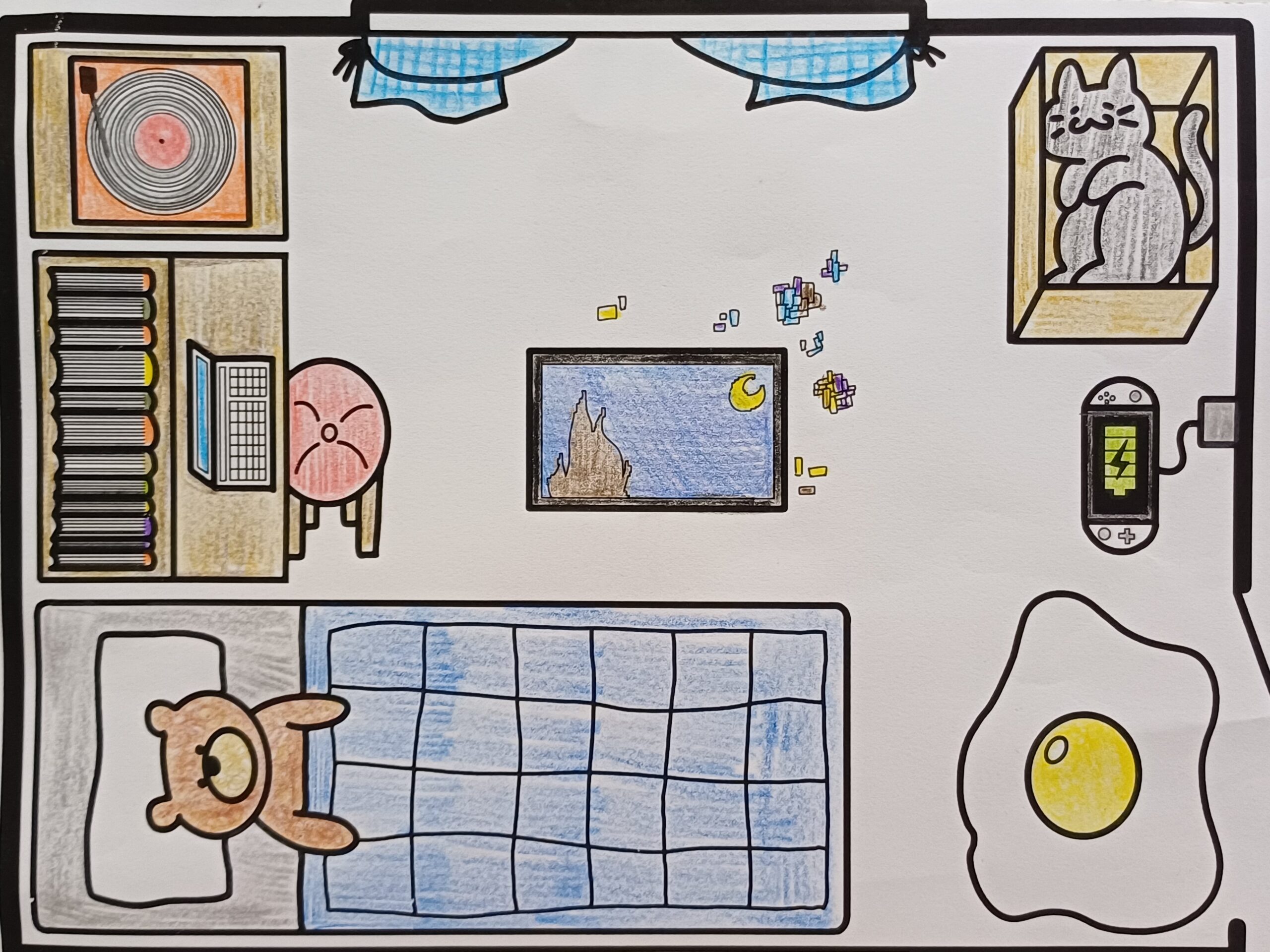
Now that the students have studied how to use nouns and adjectives, it’s time to combine everything into a long-turn speaking task. The task is to describe a room. The teacher first models the task by describing their living room and then asks the students to do the same. An extra teaching target of this lesson is introducing the simple use of prepositions of place.
This speaking exercise can be quite a challenge for students. However, if the task is gently scaffolded, they will surprise themselves. Below are two audio clips of students describing their rooms to me. Please listen to them while looking at their room plans. Even though they are not perfect (they still have a few developmental errors), you will agree that they aren’t doing too bad a job. They have practiced for their speaking turn but are not completely memorizing their speech because they use their room plan to help them remember what they want to say.
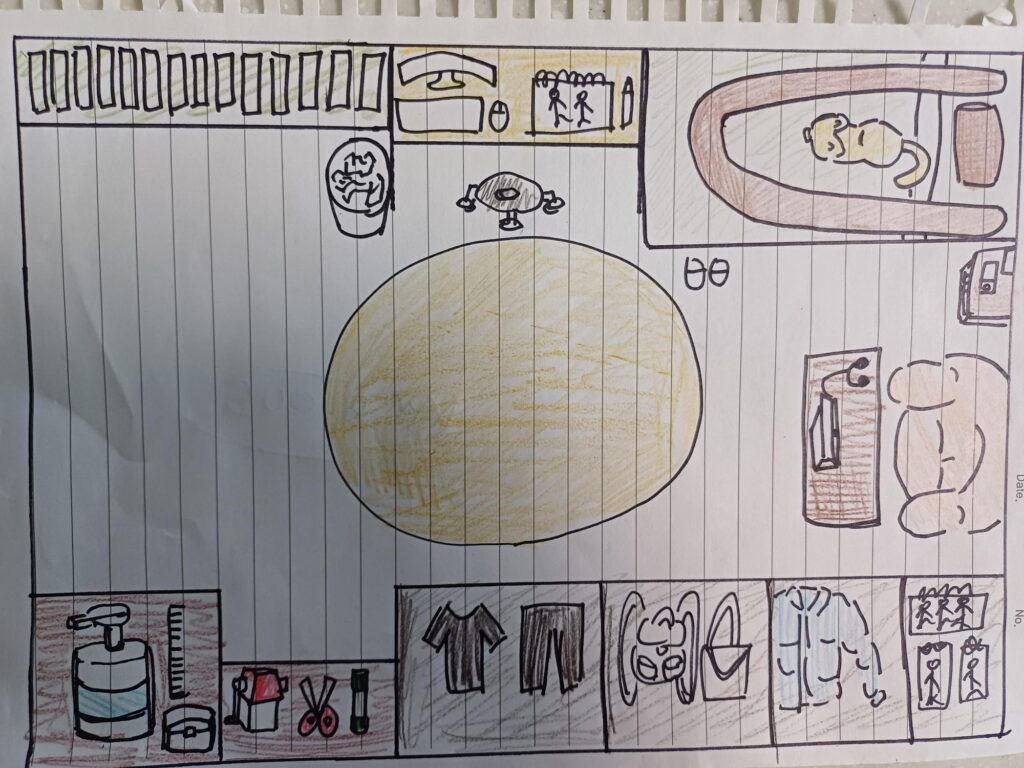
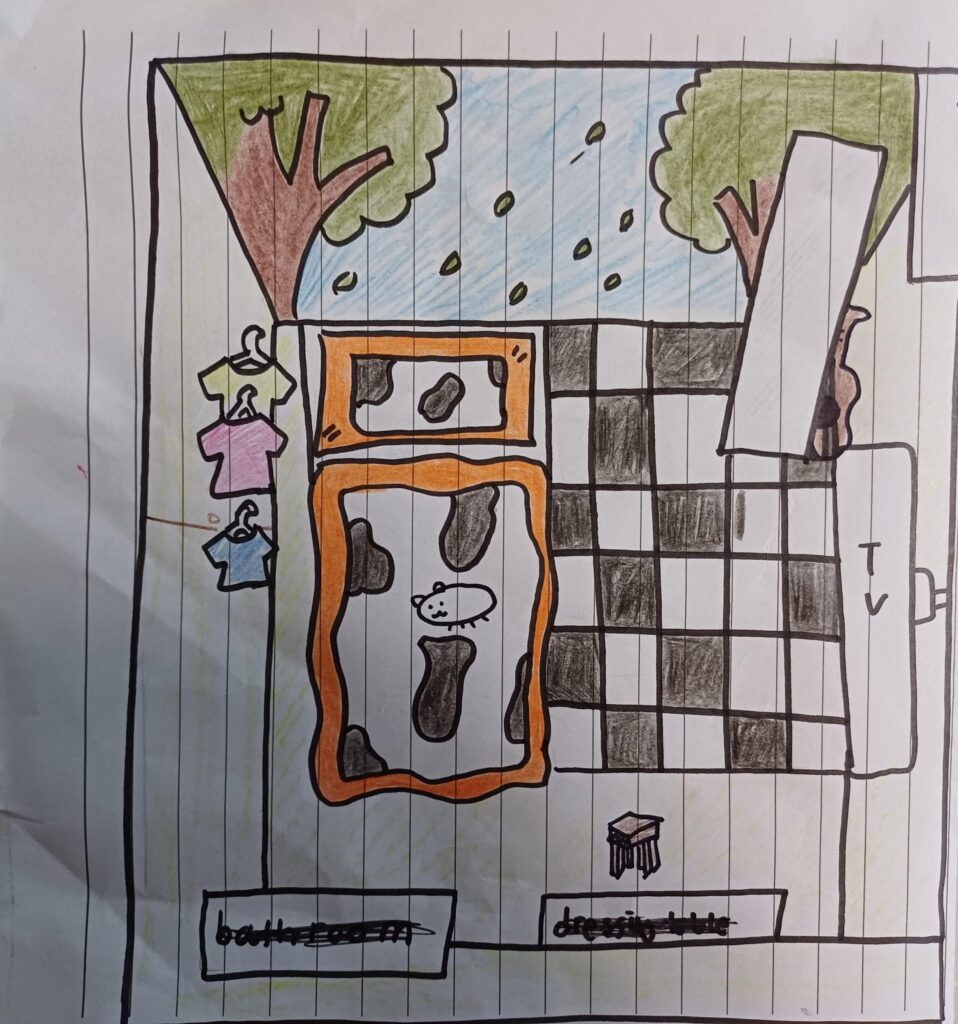
The Lesson Plan
As I work through the lesson, rather than just having the students watch me sketch out my living room passively, I involve them in building target sentences to describe each item in my room as much as possible. This is done through my outstanding drawing skills (cough!) or telling the students an interesting back story. I am constantly asking them questions and rephrasing new questions. The students already know some nouns, adjectives, and prepositions to use, so I am working with them to combine all parts of the sentence.
(Note: For ease of readability in this lesson plan, the teacher’s voice will be in this color, and the students’ desired responses (hopefully!) will be in this color.)
1) To start the lesson, the teacher explains that they will sketch out and describe their living room as it looked this morning.
-The teacher draws out a square room plan on the board and writes, ‘This is my living room’
-Next, the teacher indicates the door, window, and the room’s four corners.
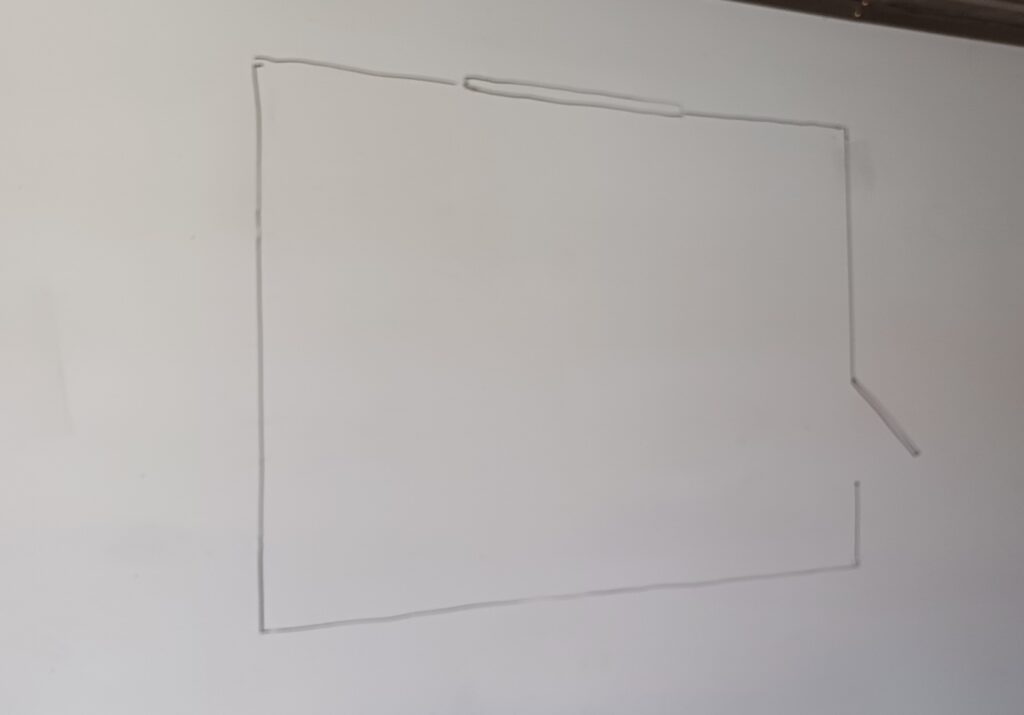
2) Now the teacher begins to fill in the room plan. First, they draw a big circle in the center of the room and ask the students:
What is it? It’s a rug.
-The teacher elicits two adjectives from the students to help describe the rug.
Is it large or small? It’s large
What shape is the rug? It’s round
Where is it? In the center
So in one sentence, we can say ‘There’s a large round rug in the center of the room.’ The teacher writes the first target sentence on the board.
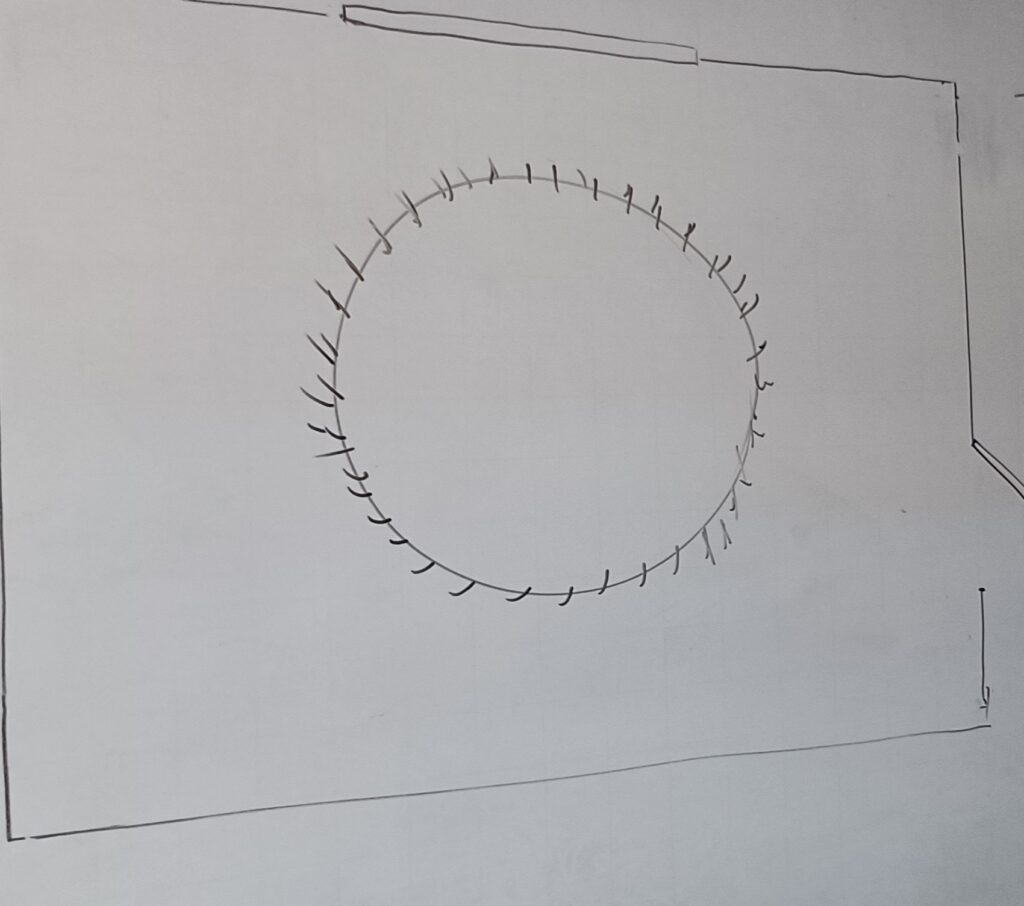
3) The teacher sketches a sleeping, oversized cat on the rug. The teacher explains:
This is my cat. His name is Malfoy, and every day, he does only two things… sleep and eat. So, how can we describe Malfoy? He’s lazy. He’s fat.
..And where is he? On the rug
-The teacher writes the second target sentence on the board.
‘There’s a fat, lazy cat on the rug.’
The teacher highlights the use of ‘the’ after the noun (a rug) is introduced in the first sentence.
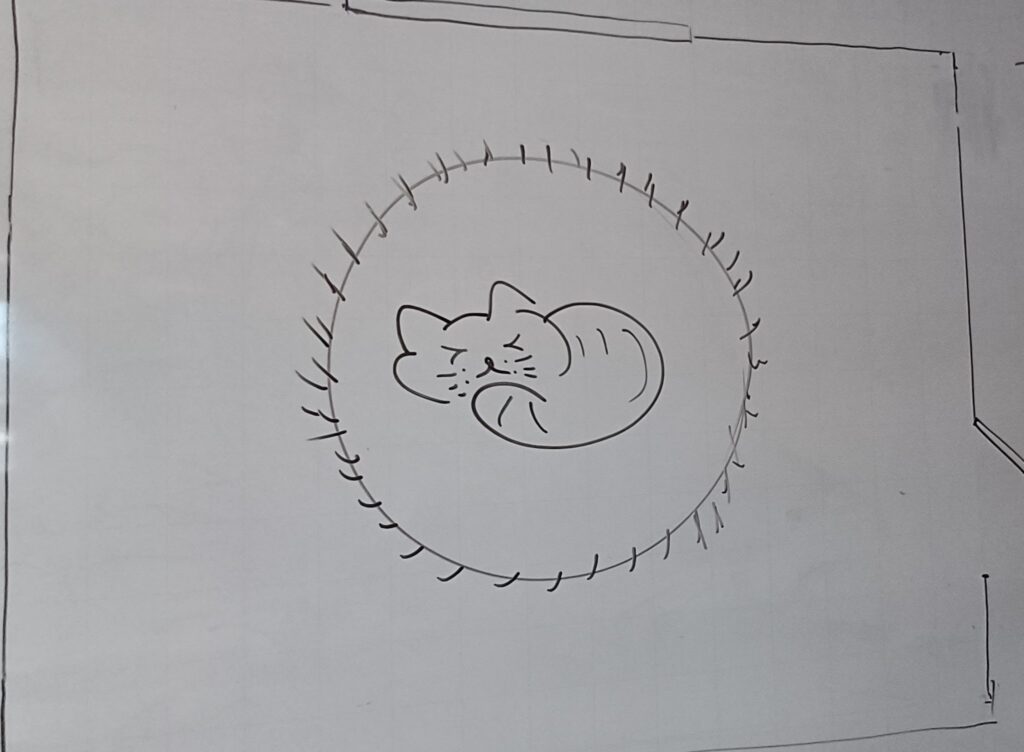
4) Next to the cat, the teacher draws a sock.
-What’s this? It’s a sock
-The teacher points to the green haze from the sock and asks:
What do you think about my sock? It’s smelly
And.. where is it? It’s next to the cat
So, how can we say that? There’s a smelly sock next to the cat.
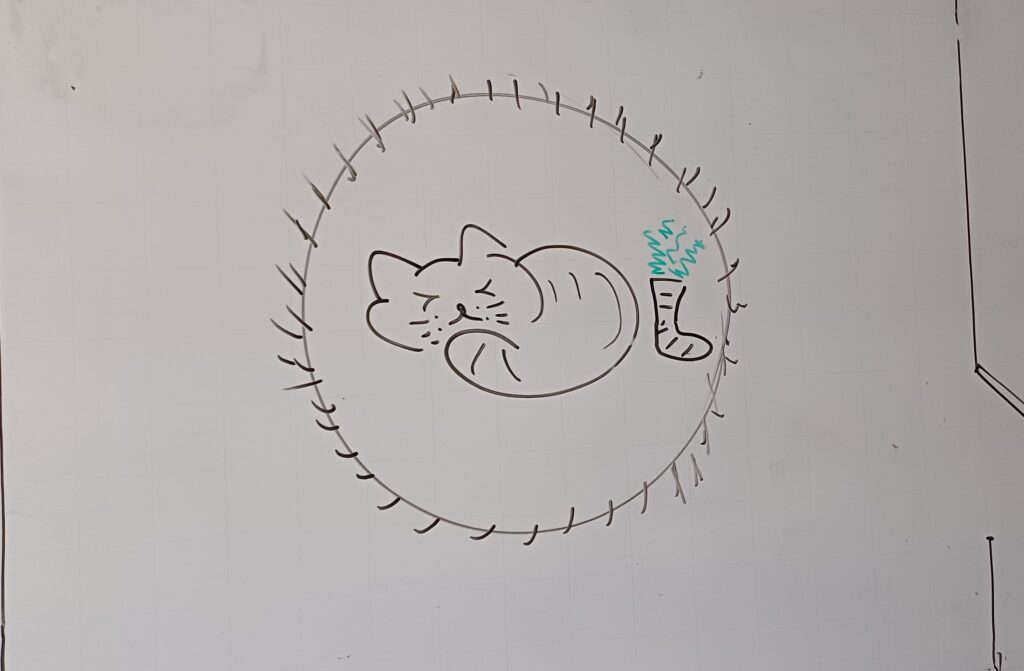
5) The teacher sketches a tall lamp in the corner.
What is it? It’s a lamp.
And is it short? No, it’s tall
So where’s the lamp? In the corner
Top corner or bottom corner? Bottom
Left corner or right corner? Right
So, can you make a complete sentence?
There’s a tall lamp in the bottom right corner.
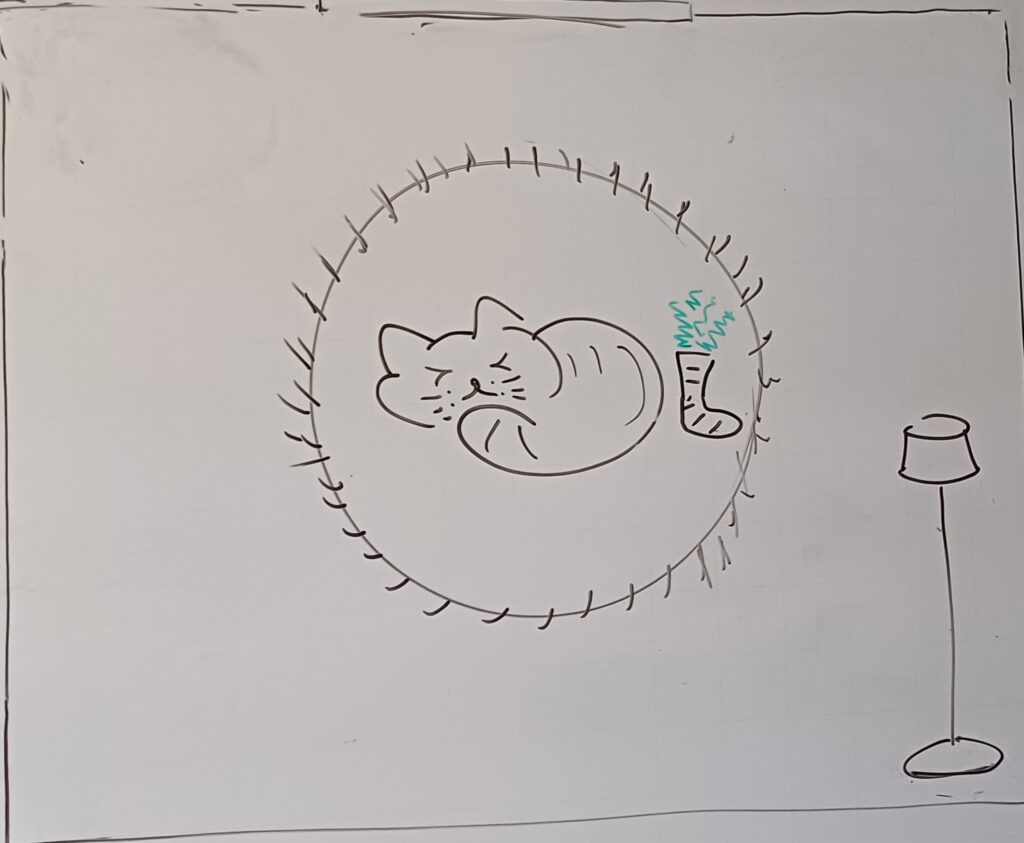
6) In the opposite corner, the teacher sketches a flower.
What is it? It’s a flower.
Is it pretty? No!
Yes, it is!…. It’s gorgeous!
Where is it? In the corner.
Which corner? The top right corner.
So, how can we say that? There’s a gorgeous flower in the top right corner.
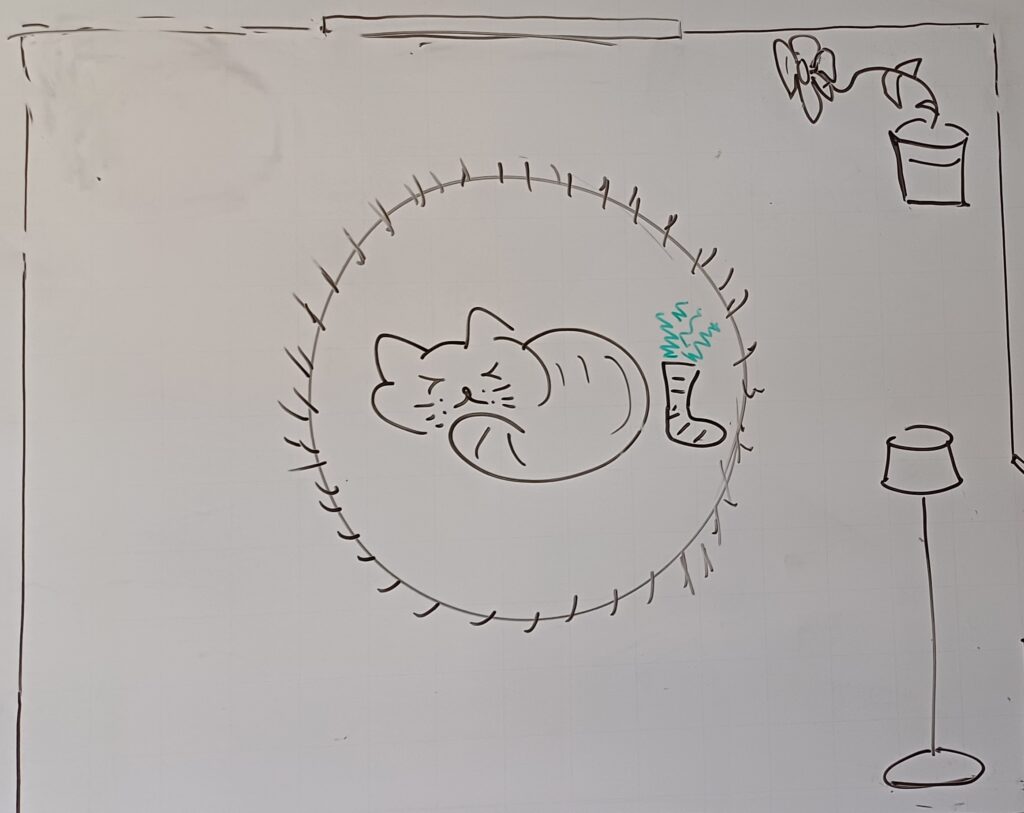
7) The teacher draws an armchair over to the other side of the room.
This is my armchair. I sit in it when I get home, and it feels SO good.
How can you describe my armchair? It’s comfortable
And where is it? It’s in the top left corner
So?
There’s a comfortable armchair in the top left corner.
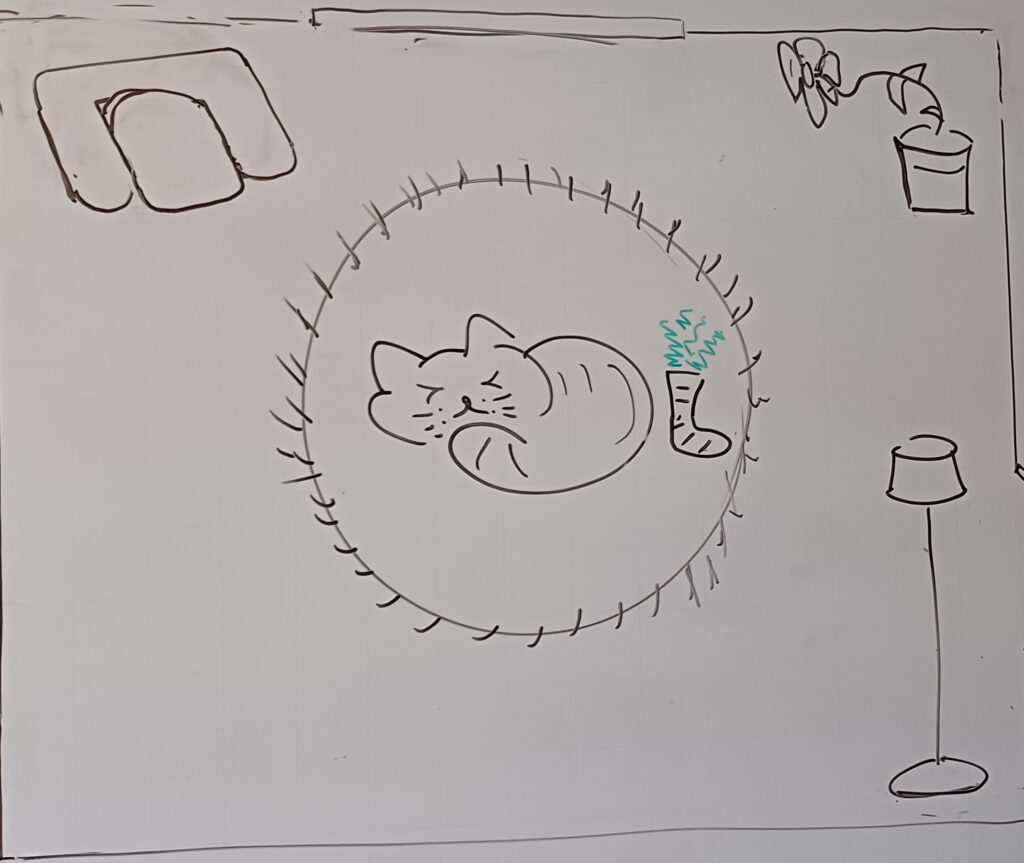
8) Now the teacher sketches a sofa.
This is my sofa. I bought it fifteen years ago. The teacher indicates old food stains, dust, etc., on the couch.
So, how can you describe my sofa? It’s dirty. It’s old.
Good…and can we make a sentence?
There’s a dirty old sofa between the armchair and the flower.
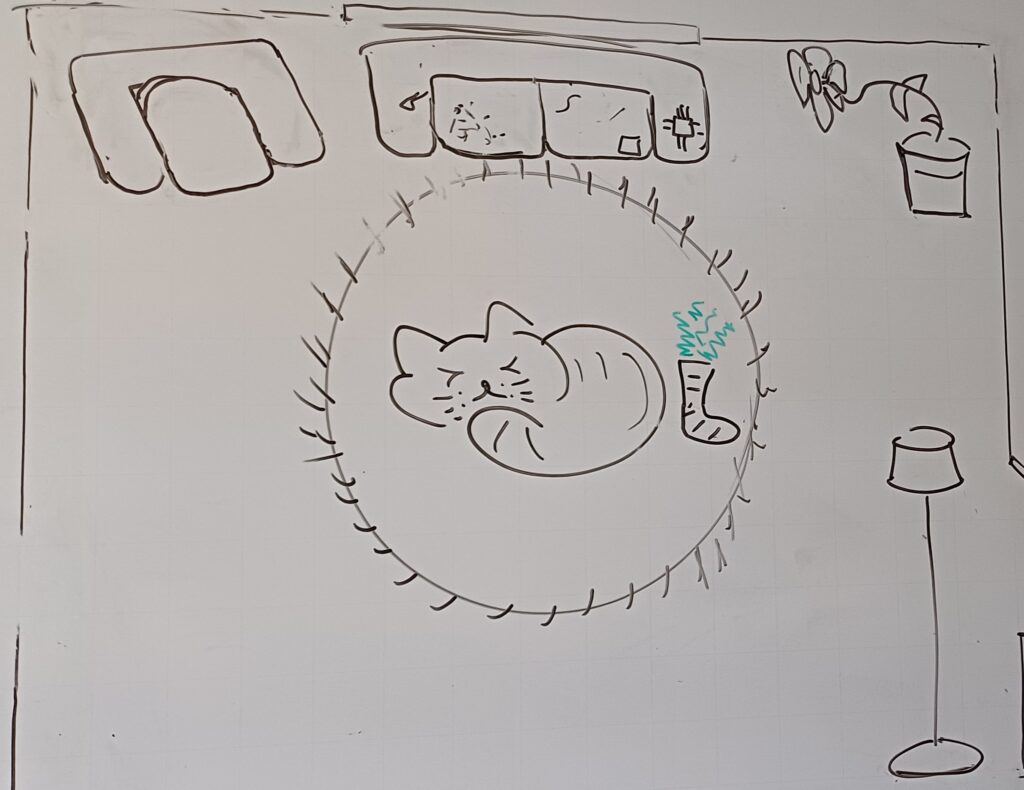
9) In the last corner, the teacher sketches a TV
So what do you think this is? It’s a TV.
Right…it cost me 2000 dollars! How can you describe it? Expensive!
… And where is it? It’s in the bottom left corner.
So, can you make a sentence?
There’s an expensive TV in the bottom left corner.
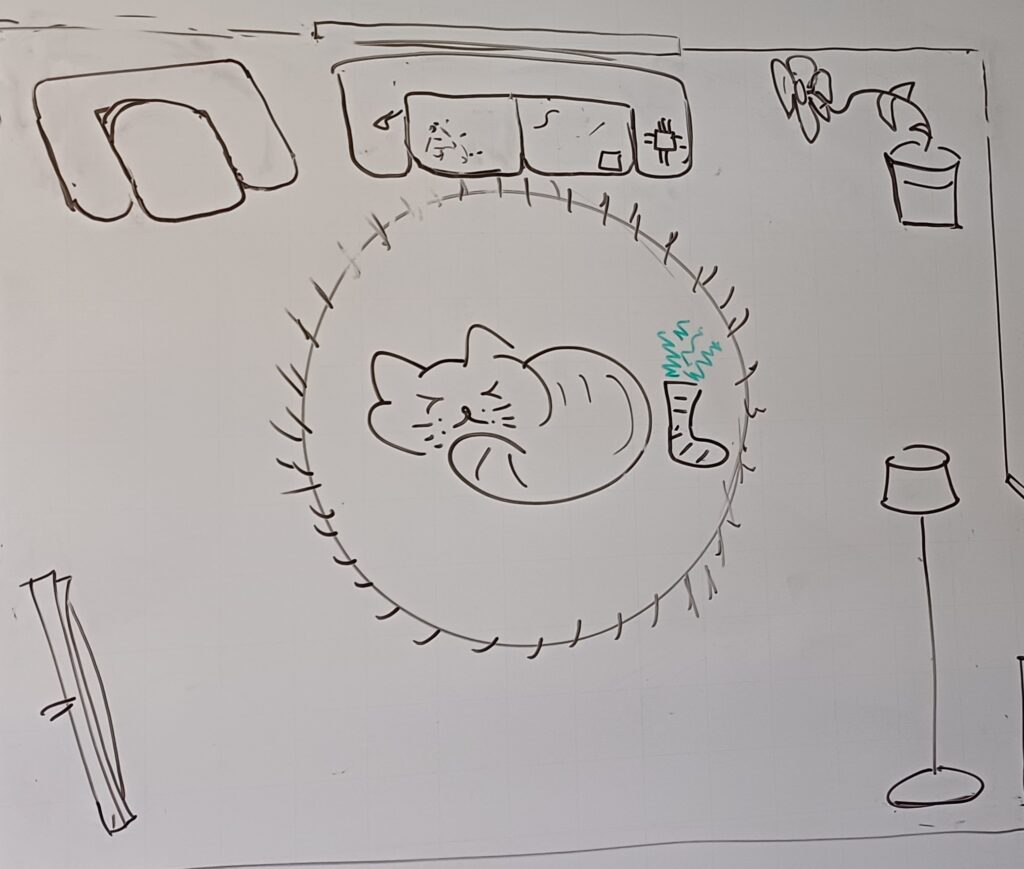
10) Behind the TV, the teacher sketches some dust.
What is it? It’s some dust.
Is it a little dust? No.. a lot of dust.
…..and where’s the dust? Behind the TV.
So, how can we say that in one sentence?
There’s a lot of dust behind the TV.
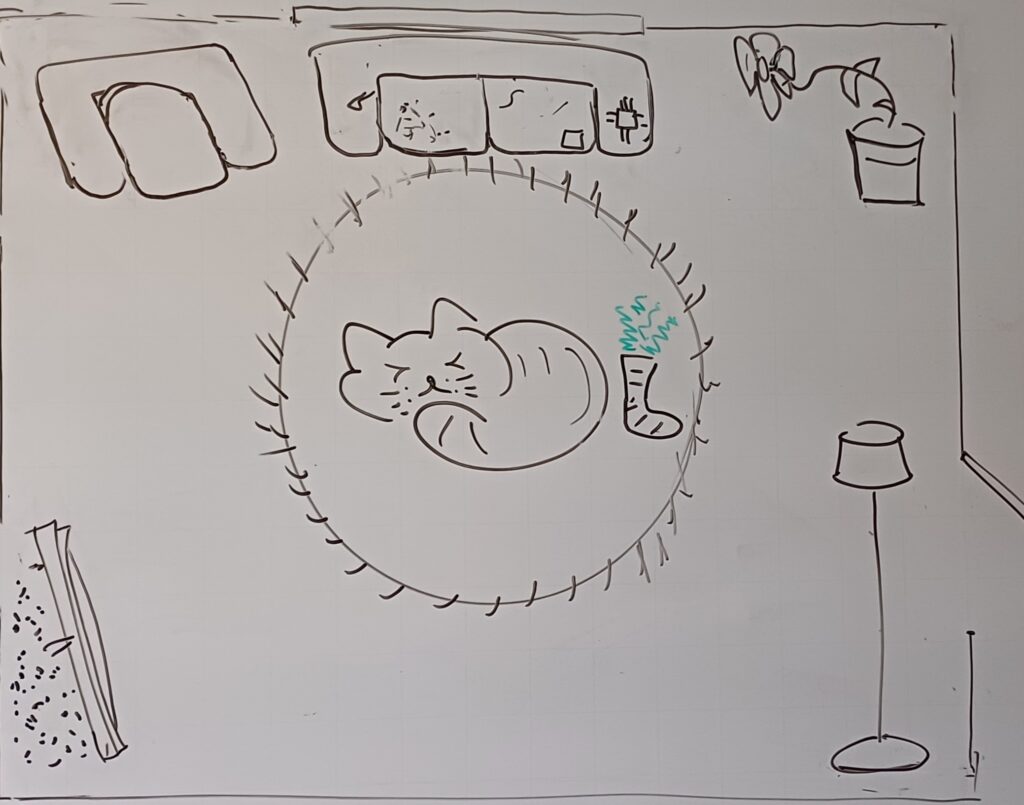
11) The teacher sketches a table.
This is a table, and (pointing) from here to here is two meters long. How can we describe it? It’s long.
Correct …So, how can we make a sentence?
There’s a long table between the armchair and the TV.
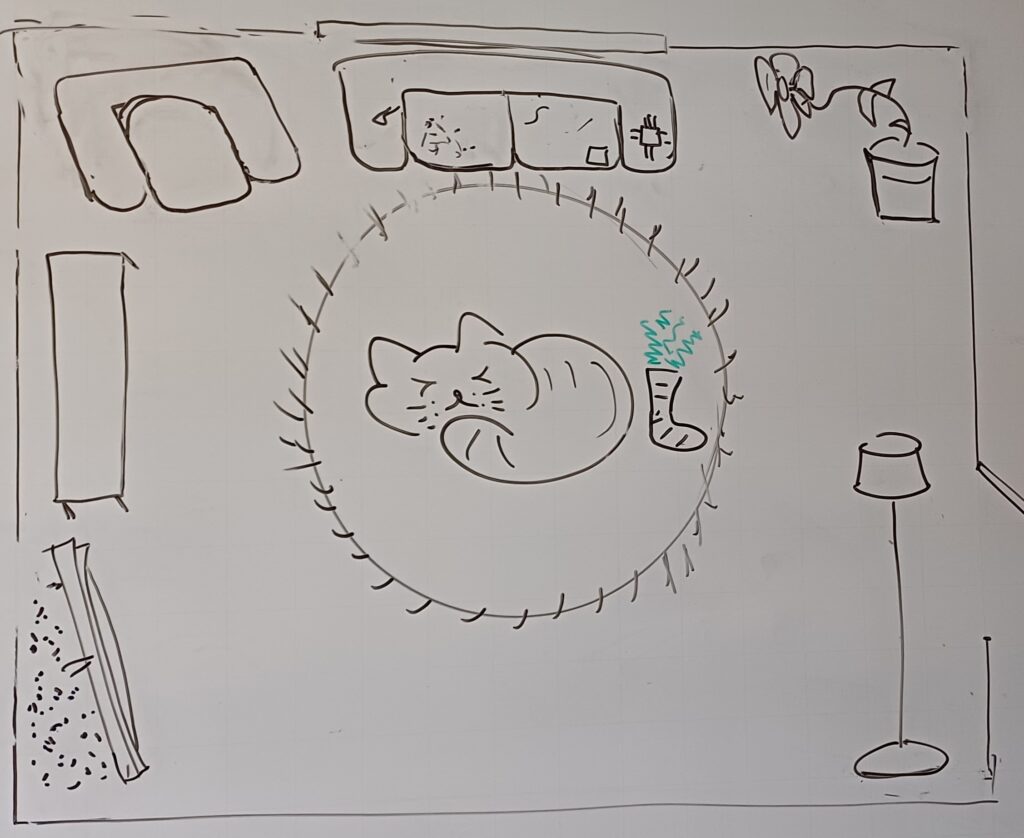
12) Now, the teacher sketches two keys on the table with a pair of slippers poking out from under it.
What are these? They’re keys.
How many can you see? Two.
Can you remember how we describe two objects together? A couple.
That’s right….so? There are a couple of keys on the table.
-The teacher points to the slippers under the table. Does anyone know what these are? They’re slippers… Right, my girlfriend bought them for me for my birthday. They are made of wool and they feel very soft. We can describe them as ‘fluffy’. Can you remember how we describe two things that are the same? A pair… Right, and where are they? Under the table…Correct.. so a sentence, please…
There’s a pair of fluffy slippers under the table.
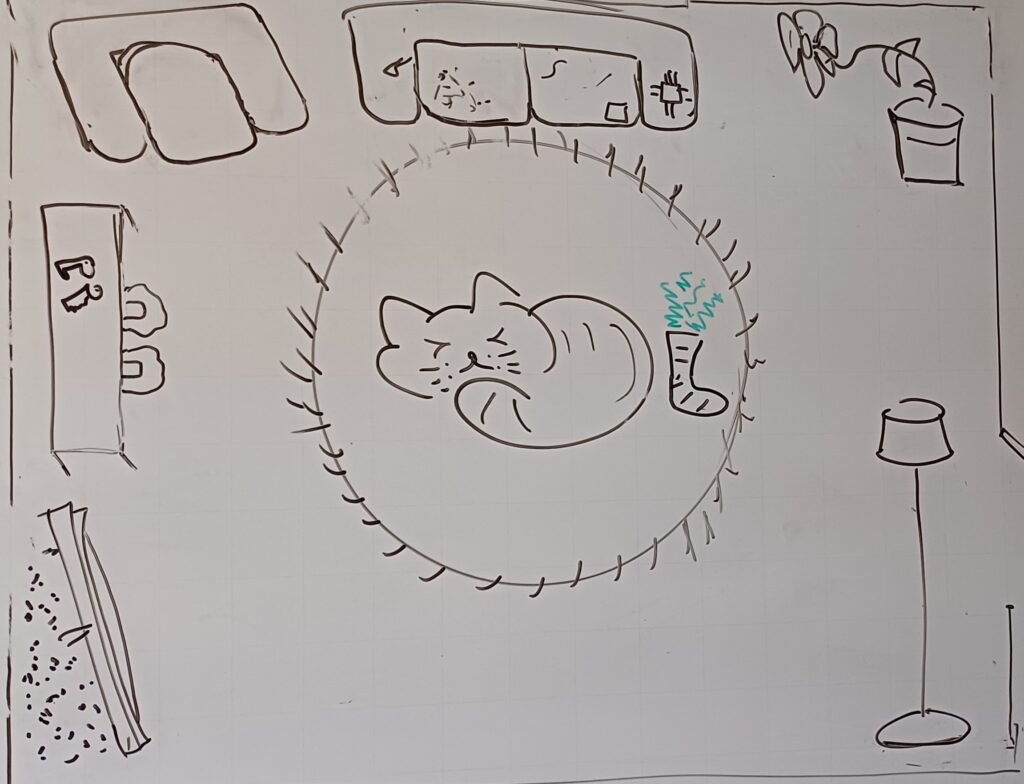
13) For the following sentence, the teacher sketches out four cans. What do you think these are? Beer cans.
Right…. I drank them last night. How can you describe them? Empty.
Right …and where are they? In front of the armchair.
So the sentence is? A few empty beer cans( or your drink of choice) are in front of the armchair.
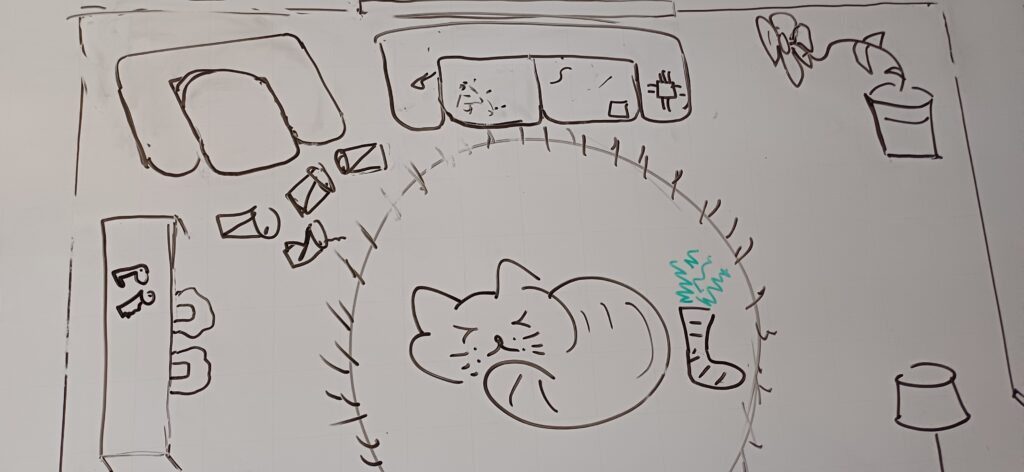
14) To complete the sketch, the teacher draws a fish tank.
Does anybody know what this is? It’s a fish tank.
Right. Is it small? No, it’s big. Right …is it big or very big? It’s very big. Right… if something is very big, we say it’s ‘huge’. So, can you make a sentence?
There’s a huge fish tank between the TV and the lamp.
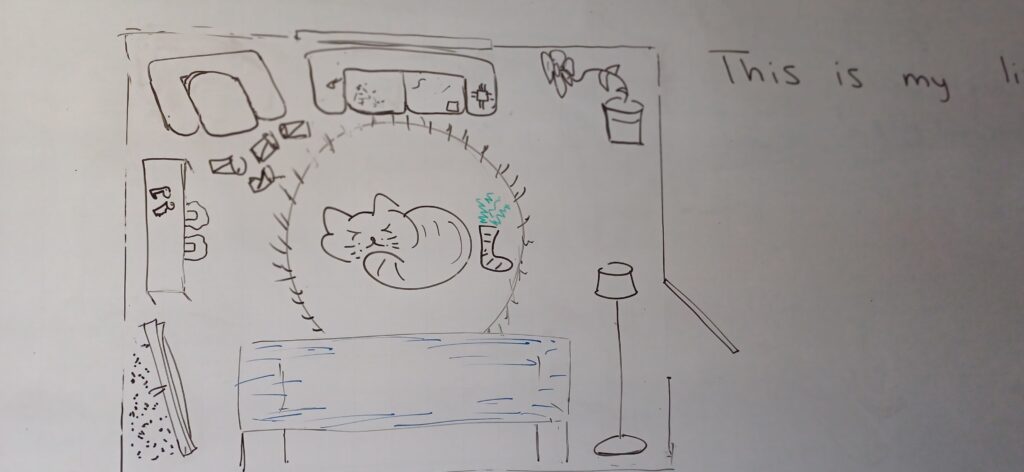
15) Lastly, the teacher sketches a fish upside down in the tank.
This is my fish. His name is Hagrid. This morning when I looked in the fish tank….poor Hagrid was dead!. (the teacher pretends to be sad)…anyway…sniff…. a sentence please….sniff
There’s a dead fish in the tank.
Right, but how did he die? There’s a hint in the picture somewhere.
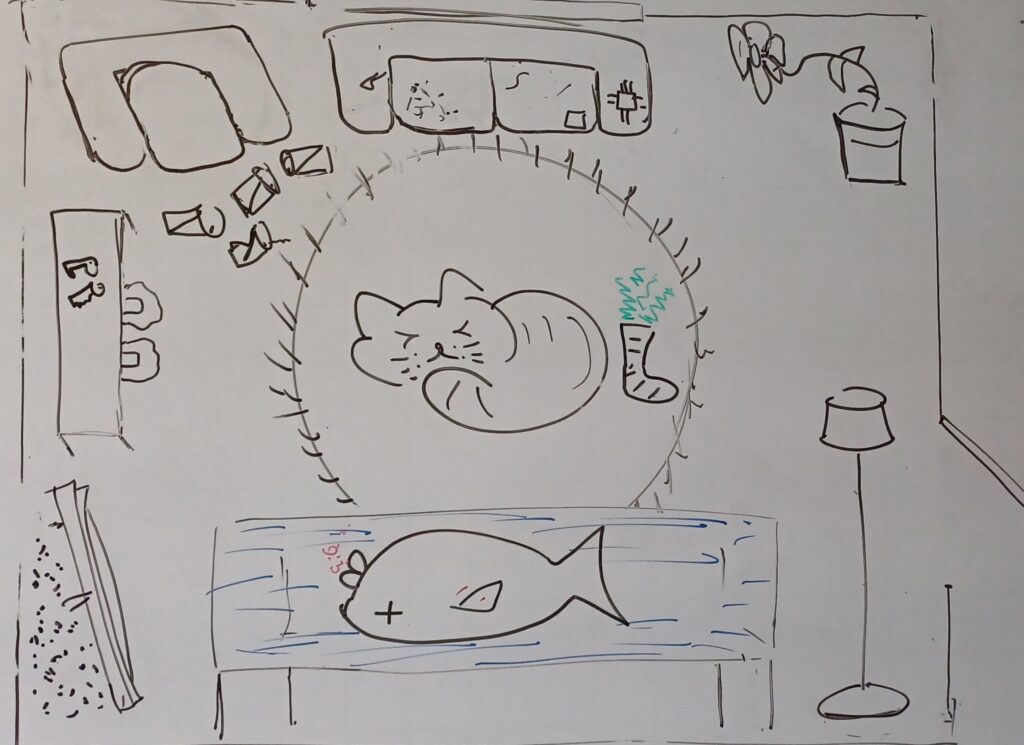
-The students then get to work shouting reasons for Hagrid’s demise. Usually, guesses like:
The water is dirty. The teacher refutes each guess….No, I clean it every week!
He’s lonely … He has an expensive TV to watch!
Malfroy killed him…Malfroy is so lazy. The fish tank is too far for Malfroy to walk!!
-Eventually, one student will guess it is due to the smelly sock. It is time for the teacher to end the mystery…..
So I came home last night and I was so tired. I sat on my armchair and drank four cans of beer, but I couldn’t relax because Malfroy kept miaowing at me. So I took off one of my smelly socks …..’ Shut up Malfroy’ I said (a Harry Potter line) and threw the sock, but it missed and dropped into the fish tank. It was so smelly that it killed Hagrid. The teacher draws in the smelly second sock next to the unfortunate fish as a cause of death.
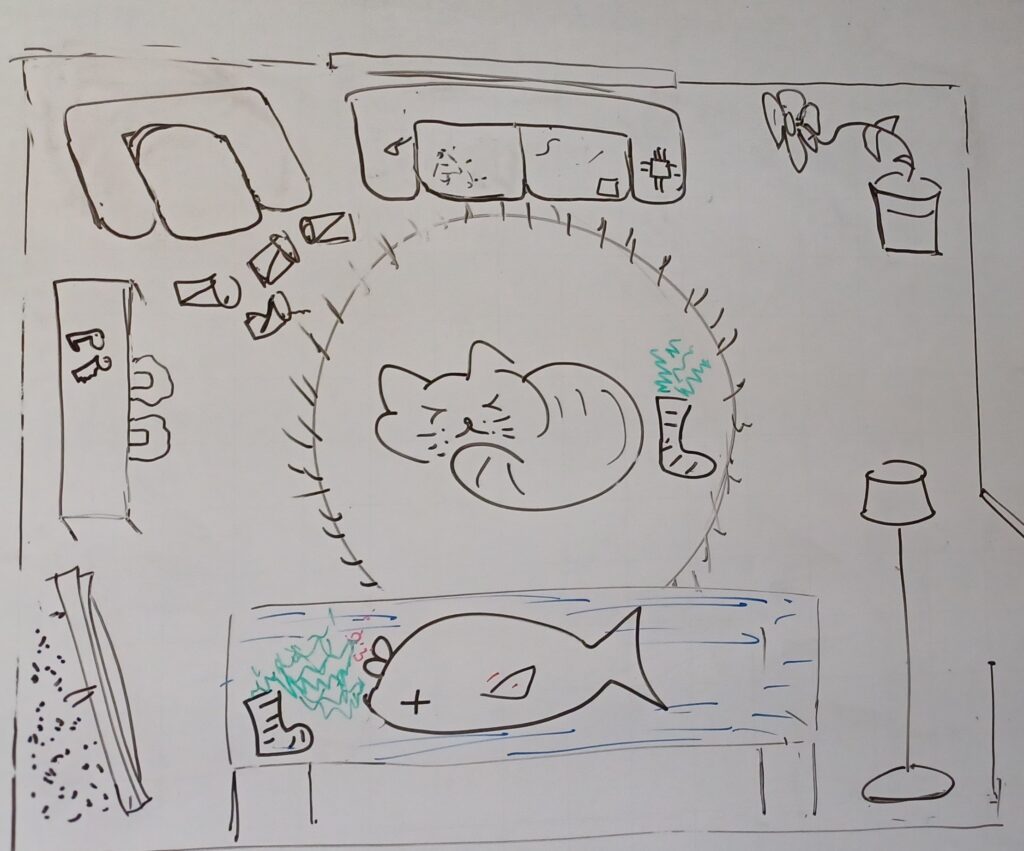
Instructions for students
-Draw a plan of your room on a sheet of paper. It can be your living room or your bedroom.
-Tell me about your room.
-Try to use interesting adjectives
After all that speaking, I think your students deserve a game. Check out my ESL games and activity book here. With a copy of this by your side, you will NEVER run out of fun things to do to liven up your classroom again.
